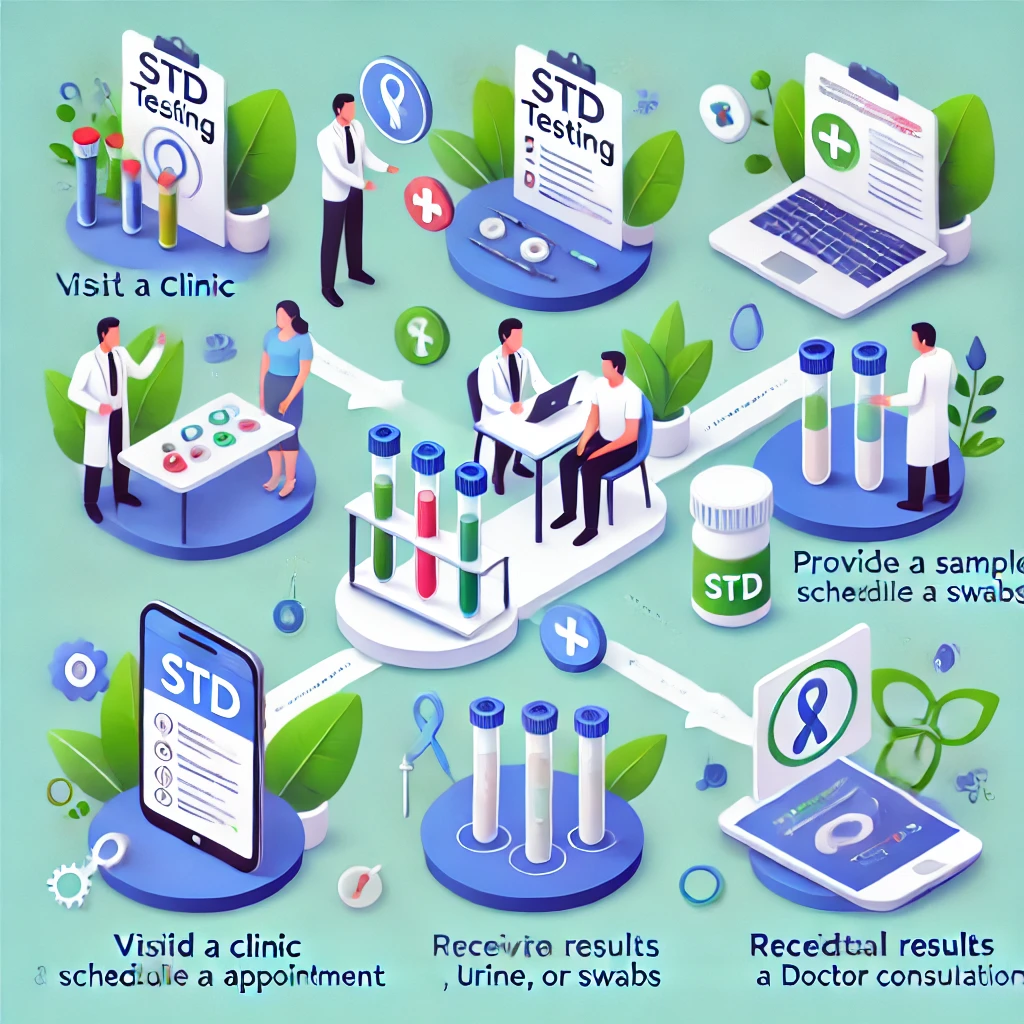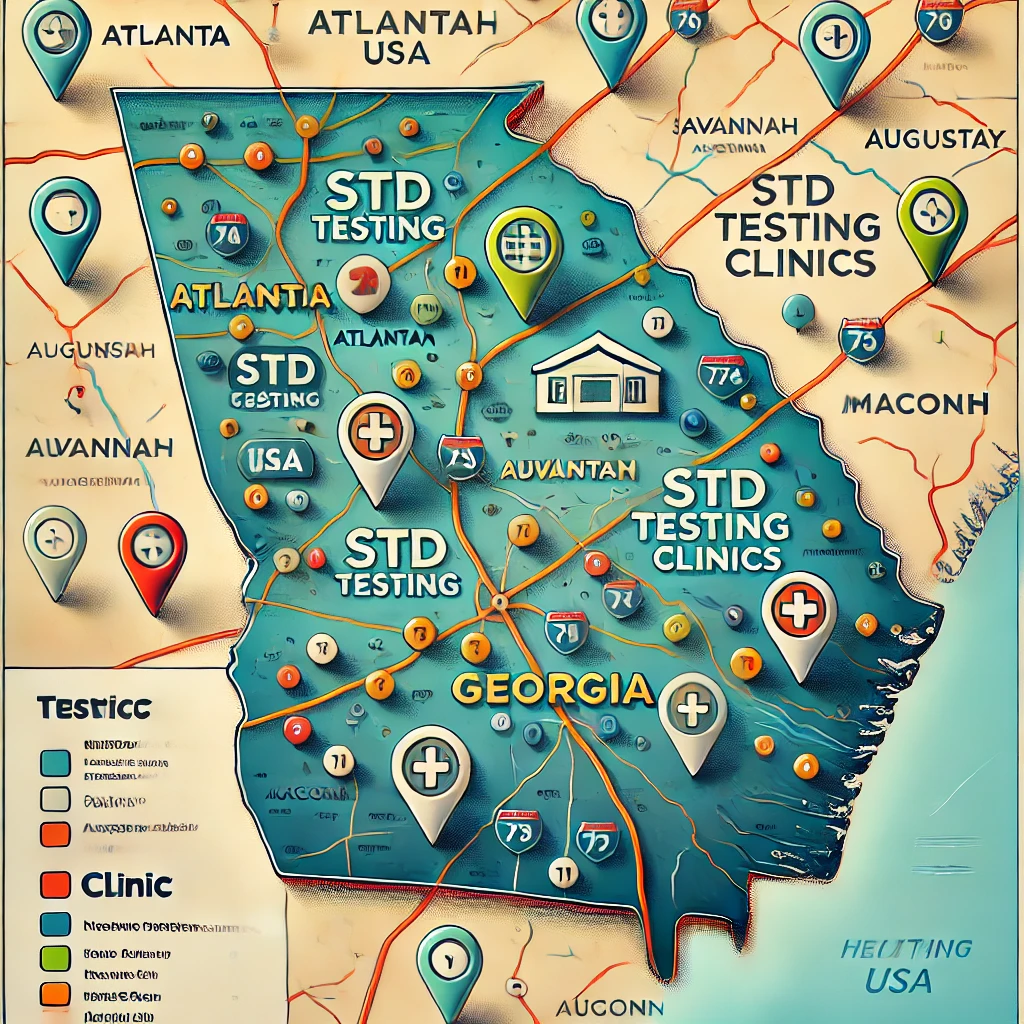Among the leading public health concerns, sexually transmitted diseases rank high and affect millions of people annually in the United States. Early testing and treatment are necessary to preserve sexual health and limit the proliferation of an infection. Getting tested for STDs in Georgia is easier now, with a variety of clinics, health departments, and private laboratories offering their services. The following detailed guide will explain everything about STD testing in Georgia, from available services to costs and privacy considerations.
Why STD Testing Is Important?
Table of Contents
Toggle- Why STD Testing Is Important?
- Common STDs and Recommended Screening
- Who Should Get Tested for STDs?
- STD Testing Services in Georgia
- What to Expect During an STD Test
- Privacy and Security Concerns
- Costs of STD testing in Georgia
- STD Rates and Trends in Georgia
- Where to Get Tested in Georgia Top Testing Locations
- How to Reduce the Risk of STDs
- FAQs About STD Testing in Georgia
- Conclusion
Testing for STDs is important in public health; it allows for early diagnosis and timely treatment. Many of the STDs, such as chlamydia, gonorrhea, and HIV, are often asymptomatic for long durations and may lead to complications if not treated. Regular testing assists in:
- Minimizing complications: Early diagnosis drastically reduces the risk of infertility, damage to organs, and other life-threatening conditions.
- Close transmission: Awareness of your status is empowering in taking action to protect others.
- Provide peace of mind: Testing allows people to take control of their sexual health.
Common STDs and Recommended Screening
The most common STDs in Georgia include:
- Chlamydia: This is a symptom-less STD and it’s the most reported in Georgia. The yearly testing is recommended for all sexually active people who are less than 25 years old.
- Gonorrhea: This infection is often diagnosed to coincide with chlamydia, and testing is usually recommended in the routine check-ups.
- Syphilis: The prevalence of syphilis in men is on the rise in Georgia. Blood tests are the general methods for diagnosing it.
- HIV: Georgia is considered one of the highest states with rates of HIV, and frequent testing is important early.
- Herpes (HSV-1 and HSV-2): Usually when symptoms are present or you request it.
Who Should Get Tested for STDs?
The frequency of testing depends on a variety of factors, including age, lifestyle, and risk level. The following groups should get tested for STDs on a regular basis:
- Those sexually active: Multiple or new partners are at especially increased risk.
- Pregnant women: For the health of mother and baby.
- People with history of any form of STD: for follow-up and prevention of reinfection.
- Men who have Sex with Men (MSM): These individuals have higher risks for some STDs, such as HIV and syphilis.
STD Testing Services in Georgia
Georgia has a range of testing options that cater to different needs, budgets, and privacy concerns.
- Public Health Clinics
The Georgia Department of Public Health operates county health departments statewide that provide free or low-cost testing for HIV, syphilis, gonorrhea and chlamydia.- Advantages: Inexpensive or free, easily accessible.
- Locations: See the DPH website for a clinic nearest you.
- Private clinics/laboratories
Full-service STD testing packages are available from private clinics like Planned Parenthood, and labs such as Quest Diagnostics.- Benefits: More varieties of tests available, speedier results, and a larger amount of privacy.
- Considerations: Cost depends on insurance coverage.
- Home Testing Kits
FDA-approved at-home testing kits make it discreet for the testing of STDs in private. Samples are collected privately and sent to a lab for analysis.- Advantages: Full privacy, convenience.
- Popular Brands: Everlywell, MyLab Box, and LetsGetChecked.
- Community-Based Organizations
Most nonprofit and community health groups provide free HIV testing along with education in both rural and urban areas.
What to Expect During an STD Test
STD testing is easy, fast, and private. Here’s what usually happens:
- Pre-Test Consultation: Symptoms, case history, and other risk factors are discussed with a healthcare professional.
- Sample Collection:
- Testing Techniques urine test: Most common for chlamydia and gonorrhea.
- Blood test for syphilis, HIV, and herpes.
- Swab tests: Samples are collected from throat, rectum, and genitals-according to the exposure.
- Results: Most take a few days. There are rapid tests for HIV that may give results in less than 30 minutes.
Privacy and Security Concerns
For people wanting to get tested for STDs, privacy is a major concern. In Georgia, all healthcare providers have to follow strict confidentiality laws implemented by the Health Insurance Portability and Accountability Act, or HIPAA. This guarantees that:
- Results remain private without explicit consent.
- Anonymous HIV testing is available at certain clinics.
- Some services for STD testing among minors are available without parental consent.
Costs of STD testing in Georgia
The cost of testing for STDs depends on the provider, insurance coverage, and the type of tests conducted.
- Free/Low cost options: Many Community and public health clinics offer free or sliding-scale fee testing.
- Insurance: Most plans cover routine screening for sexually transmitted diseases with no copayment, but some may require it.
- Out-of-Pocket: Privately billed, range $50 –$200 per test [may offer package discounts].
STD Rates and Trends in Georgia
The trends in STDs in Georgia elucidate the need for widespread testing. According to the CDC:
- Georgia ranks in the top 10 states for prevalence of HIV.
- Chlamydia rates are particularly high among young adults aged 15-24.
- Syphilis has recently exploded in urban centers such as Atlanta.
These figures mean that proactive testing and education play an important role in reducing infection rates.
Where to Get Tested in Georgia
Top Testing Locations
- Atlanta STD Center:
- Services Provided: Full testing for all STDs.
- Same-day appointments and confidential service are among the features.
- Website: atlantastdcenter.com
- AID Atlanta:
- Services Provided: HIV free testing, counseling, and linkage to care.
- Features: Focuses on underserved populations.
- Cobb & Douglas Public Health Clinics
- Services: Affordable testing for Cobb and Douglas county residents.
- CVS MinuteClinic
- Services: Walk-in testing conveniently available at retail locations statewide.
How to Reduce the Risk of STDs
The best way to maintain sexual health is through prevention. Here are practical steps to lower your risk:
- Use Protection: Condoms and dental dams reduce risks of transmission significantly.
- Limit Partners: Having fewer sexual partners decreases exposure.
- Vaccinate: The HPV vaccine can protect against certain strains of the virus that cause cancers.
- Regular check-ups: Annual screenings are highly important, particularly for the high-risk group.
FAQs About STD Testing in Georgia
- Is STD testing free in Georgia?
Many public health clinics offer free or low-cost STD testing. This includes HIV testing. Costs vary depending on provider and the test. - Is it possible to get tested anonymously?
Yes, some clinics in Georgia, like AID Atlanta, do offer anonymous testing to guarantee privacy. - How often should I be tested?
Testing should be done annually by sexually active people, and more frequently for those at high risk. - Is insurance needed for testing?
No insurance is necessary. Many clinics can see uninsured patients, and some have very affordable options. - Can I get all STDs tested for at once?
Yes, facilities have comprehensive panels available and private labs. - How accurate are the home testing kits?
FDA-approved kits are usually accurate but may be followed up by testing in a clinic.
Conclusion
Sexual disease testing is an important way to care for your sexual health in Georgia and prevent these infections. Solutions range from public clinics and private laboratories to home tests, so everyone will find something to their liking. By taking precautions, you contribute to having a healthier community and preserve your health.
Subscribe Our Newsletter
Our Service
Our Address
Los Angeles, California
Telephone: 1-800-456-2323
Std@stdstitest.com
Time: 9.00am-6.00pm
Copyright © STDSTITEST.com all rights reserved.







